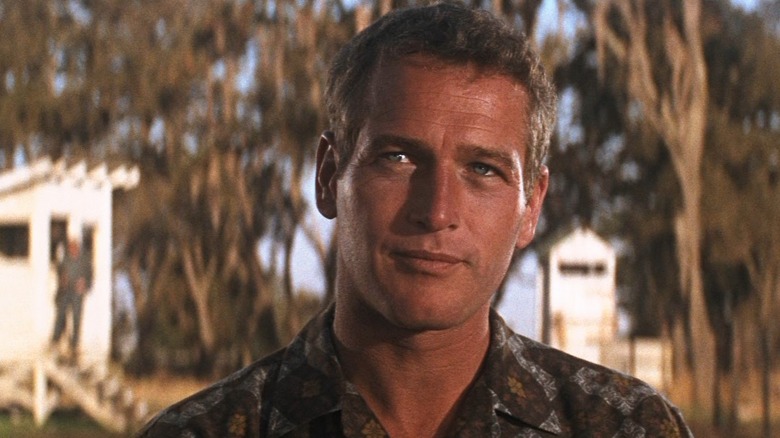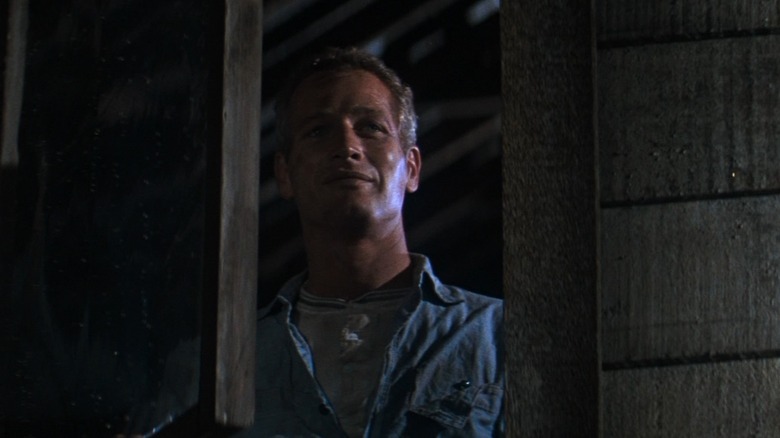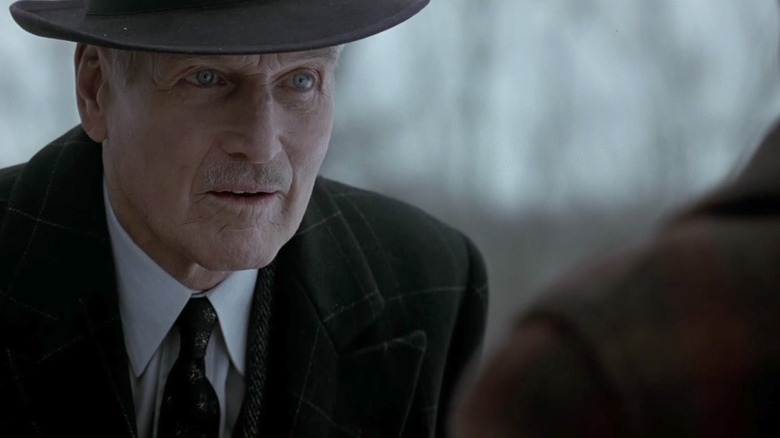When it comes to critical adoration, the late actor Paul Newman holds at least two rare distinctions. First of all, he’s one of just a handful of actors who has not one or two but three perfect Rotten Tomatoes scores under his belt, having appeared in three different movies that critics at the time (and today) unanimously agree are pretty dang good. Newman is also one of the few actors (at least that we’ve come across at /Film) whose best-reviewed movies include a couple of stone cold classics.
Most of the best movies ever made don’t seem to end up with 100% on Rotten Tomatoes, as the sheer number of professional eyes on them makes it likely that someone will eventually go against the grain. Thanks to this phenomenon, the best-reviewed movies of most actors’ careers technically tend to end up being much lesser-known (and therefore less-reviewed) films, like “Dinosaurs: Giants of Patagonia” (Donald Sutherland), “Darby O’Gill and the Little People” (Sean Connery), and “I Never Sang For My Father” (Gene Hackman). Newman bucks that trend with his iconic turn in “Cool Hand Luke,” his directorial effort “Sometimes A Great Notion,” and a Broadway recording of “Our Town” all earning an impressive 100% fresh rating on the aggregate site.
Cool Hand Luke won over critics, as did a Newman-directed adaptation
“Cool Hand Luke” is by far the most famous of these three decorated films. The 1967 film from director Stuart Rosenberg is on one level a prison movie, on another a fairly blunt and punishing commentary on establishment issues of the decade -– most obviously, as Roger Ebert recalled in his 2008 essay on the film, the Vietnam War.
Newman stars as Luke, a tortured Florida chain gang prisoner who is singled out by guards for his unwillingness to go along with the status quo. “Cool Hand Luke” made some money at the box office, earned four Oscar nominations (and a win for George Kennedy), and ended up in the National Film Registry at the Library of Congress. No less than 56 Rotten Tomatoes critics have all agreed that the film is worth watching, with Ebert writing in his four-star review that it’s “a tough, honest film with backbone” and “something to say about the current status of heroism.”
Four years after playing Luke, Newman would go on to star in his second “perfect” film, the 1971 drama “Sometimes a Great Notion.” Based on a book by “One Flew Over the Cuckoo’s Nest” author Ken Kesey, “Notion” also starred Henry Fonda and Lee Remick, with an uncredited appearance from Newman’s daughter Melissa. The film was Newman’s second feature-length directorial effort after the 1968 drama “Rachel, Rachel” (which was also acclaimed, making him an actor with an unusually fruitful transition to filmmaking).
The unusual story follows the Stampers, a family of Oregon loggers who oppose a lumber workers’ strike. The family’s surprising choice to work as scabs instead of supporting their local union ultimately has dire consequences for several relatives. Only 14 critical reviews of the film are listed on Rotten Tomatoes, but the movie was well-received. Upon release, the New York Times’ Vincent Canby wrote that Newman was “remarkably successful both in creating vivid, quite complicated characters and in communicating the sense of beautiful idiocy that is the strength of the two older Stampers.” Ebert liked this movie, too, writing in his review that Newman is “a director of sympathy and a sort of lyrical restraint” who “rarely pushes scenes to their obvious conclusions.” Newman would direct four more films in his lifetime, but no others were as critically acclaimed as this one.
Newman’s third universally acclaimed film is an adaptation of a theater classic
Newman’s final perfect score on Rotten Tomatoes comes via a rarely-referenced 2003 recording of a Broadway production of “Our Town.” Interestingly, all three of Newman’s best-reviewed works were based on books or plays, with “Cool Hand Luke” adapted from Donn Pearce’s novel and “Our Town” as one of many versions of the classic Thornton Wilder play out there. Wilder wrote the Pulitzer-winning three-act play in 1938, and its small town drama and touching sense of the passage of time made it a go-to production for theaters nationwide. By the time Newman stepped into the role of the omnipresent Stage Manager in 2003, he was in the twilight of his career, and the especially reflective role was a fitting one.
The actor was nominated for an Emmy and Screen Actors’ Guild Award for his work in “Our Town,” which was directed by Tony winner James Naughton and aired on Showtime. Newman’s wife and frequent collaborator Joanne Woodward served as the artistic director on the production. Only five Rotten Tomatoes-approved critics reviewed the TV movie, but they all praised it, with San Francisco Chronicle critic David Wiegand writing that the show “reminds us of what an extraordinary work ‘Our Town’ is and will always be, as long as it’s handled by real pros.” According to Wiegand, the play marked Newman’s first appearance on stage in 38 years. It would also be one of his last iconic roles: Newman passed away in 2008, leaving behind a legacy of many great films, including the three “perfect” movies mentioned here.





